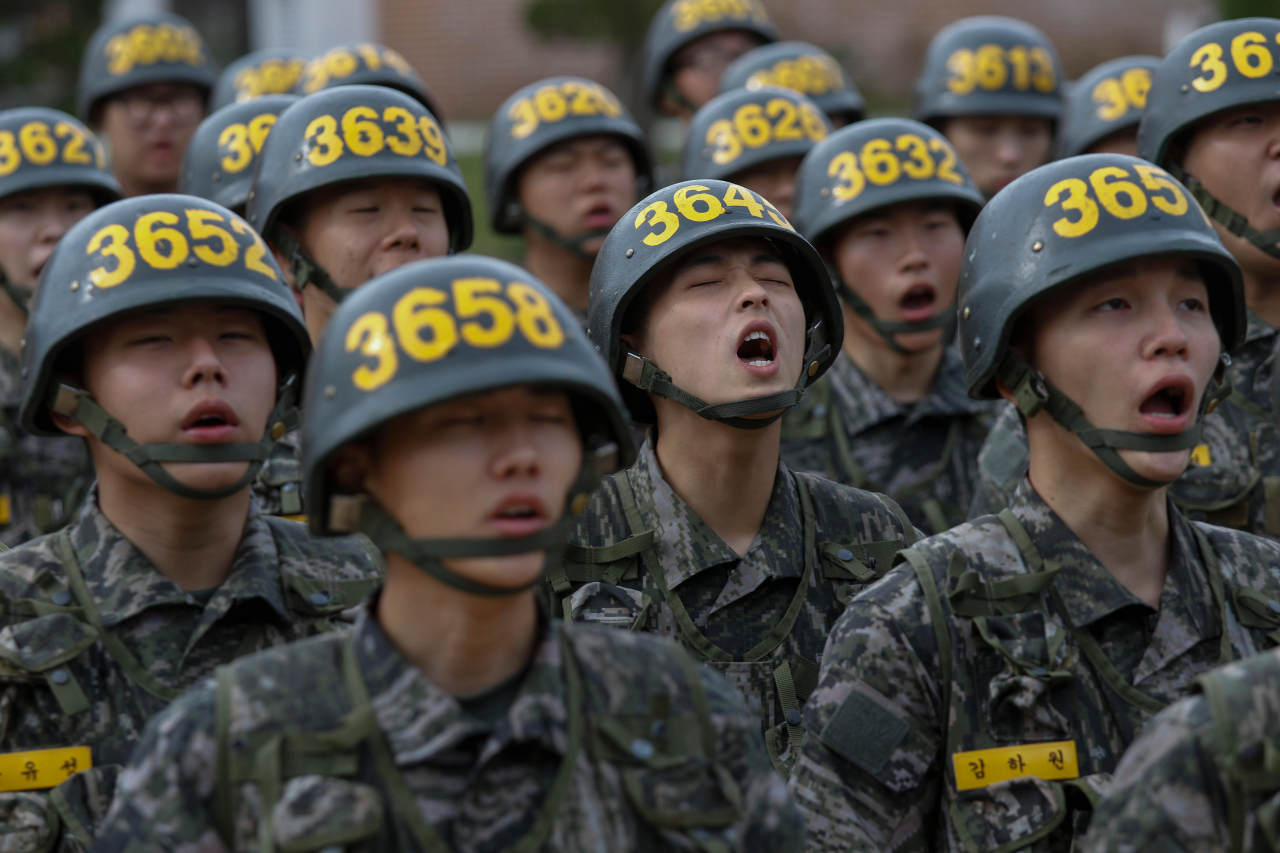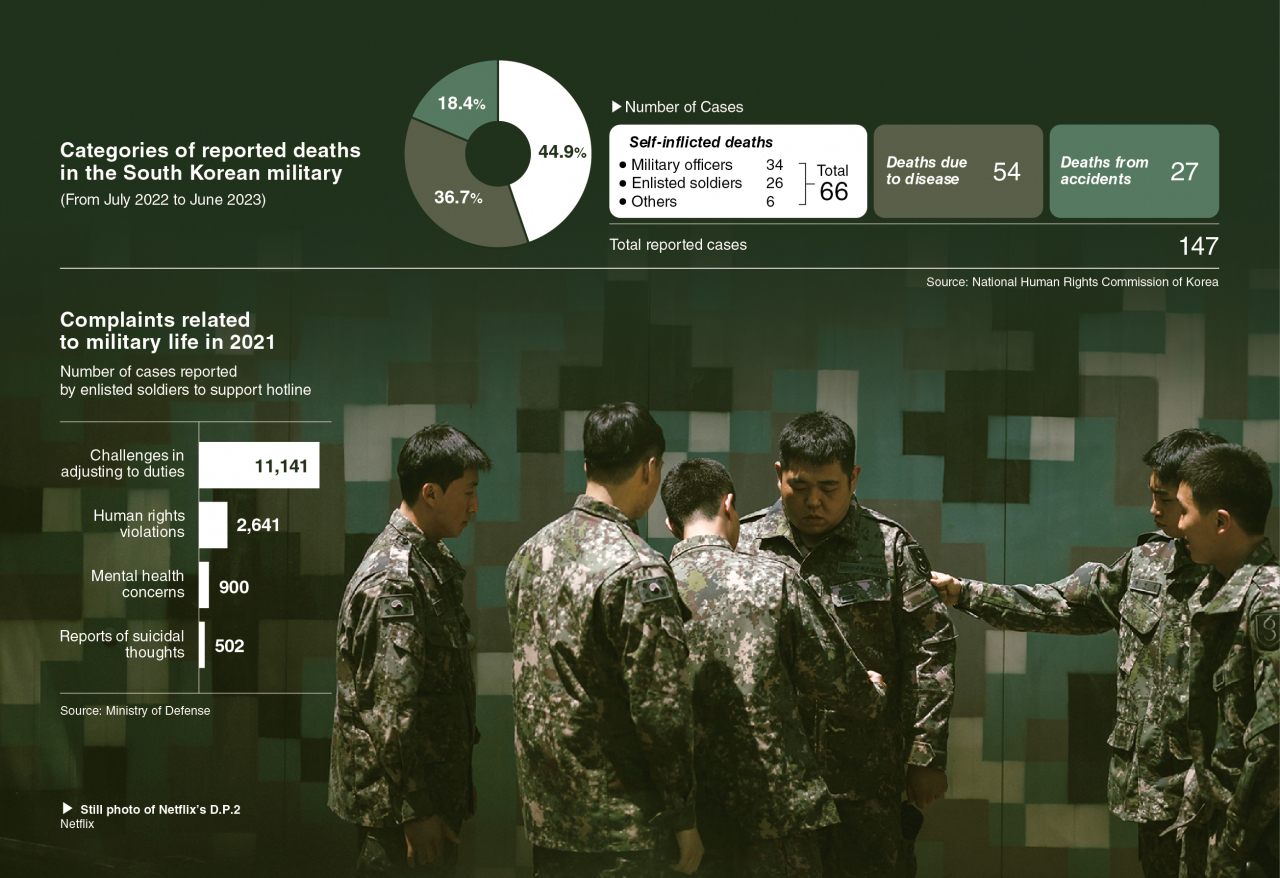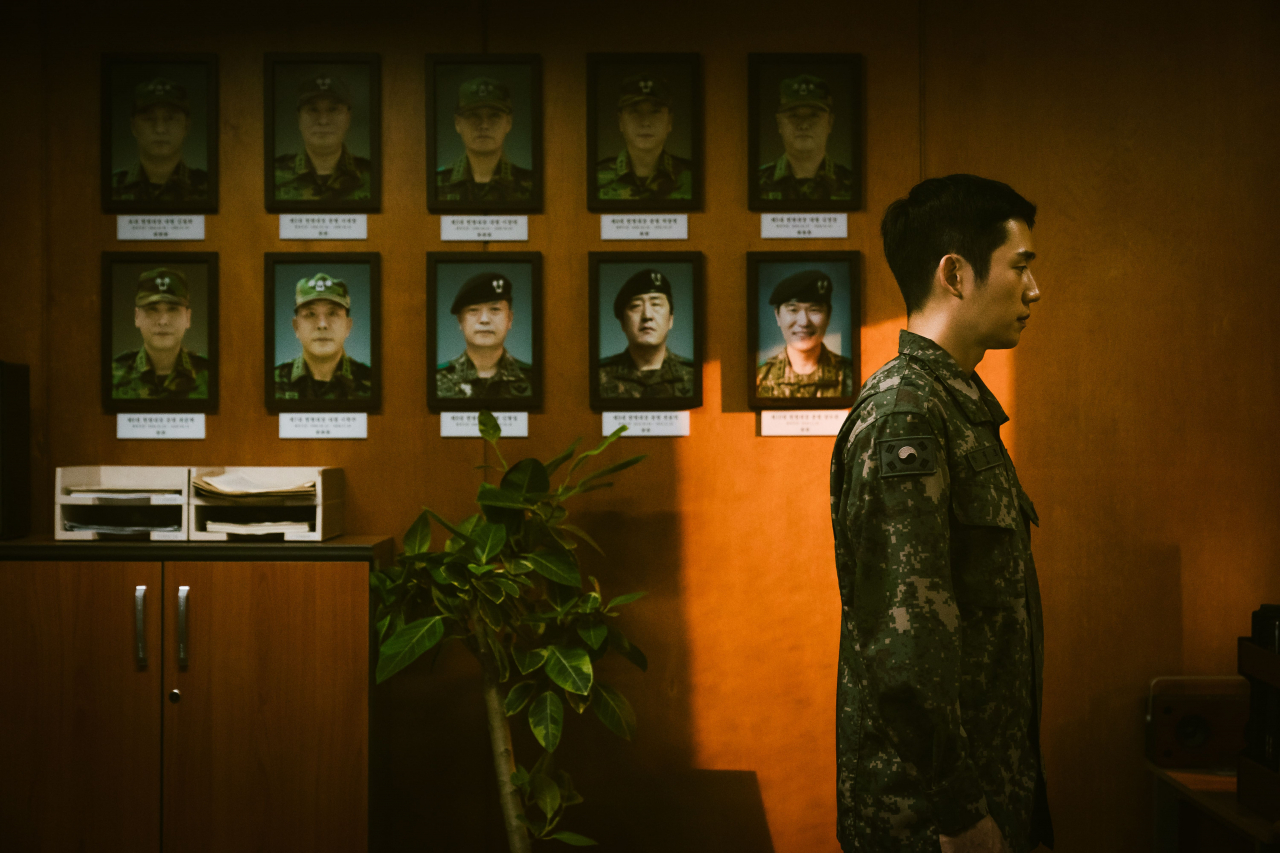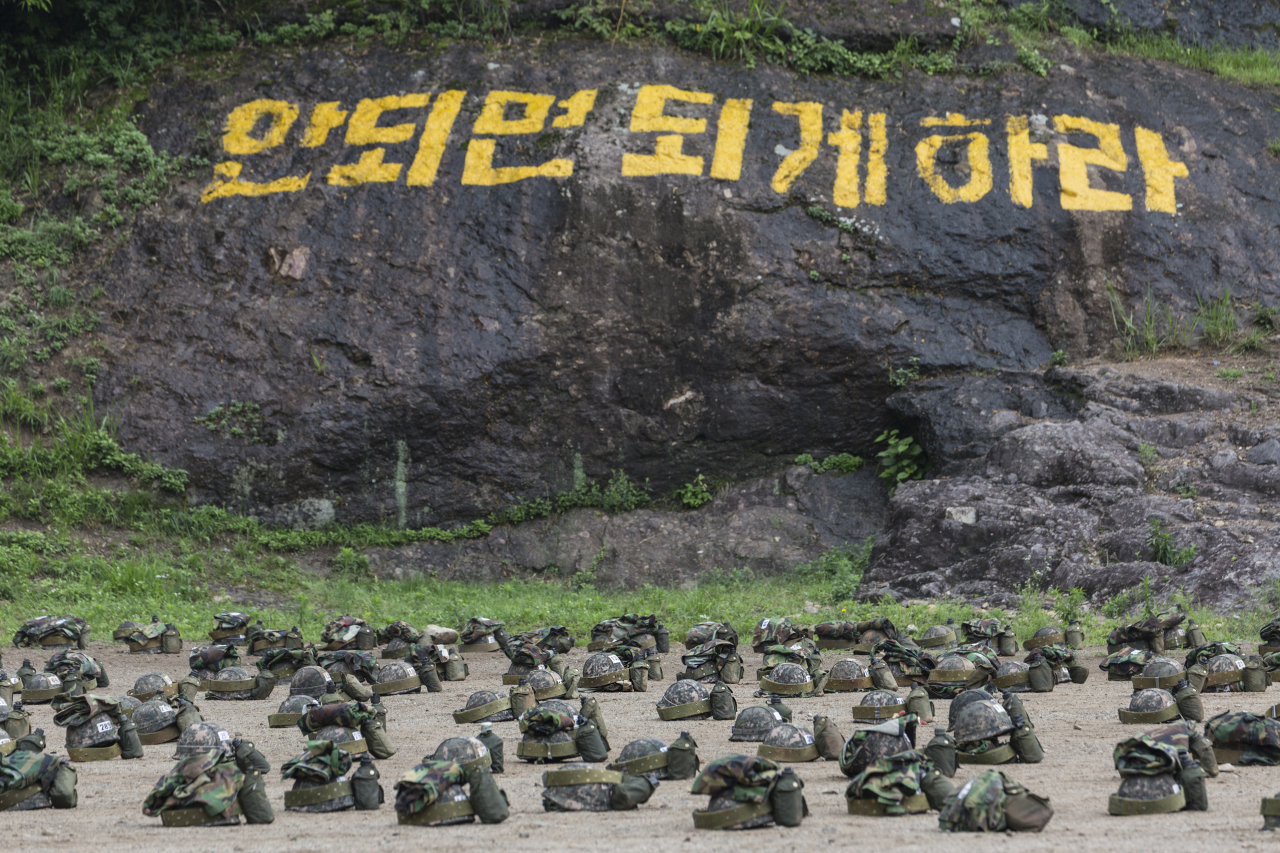[기사 News] Inside barracks: Military life still a scarring experience for many
Inside barracks: Military life still a scarring experience for many
Despite progress made on ending physical violence, psychological abuse persistsBy Ji Da-gyum
Published : Sept. 4, 2023 - 16:20
Inside barracks: Military life still a scarring experience for many (koreaherald.com)

Kim Gi-cheol remembers his son's determination to fulfill his military duty as a South Korean citizen, despite having the opportunity to secure an exemption by acquiring foreign nationality.
Having spent an extended period abroad, his son was relatively unfamiliar with the Korean language and culture. Nevertheless, Kim never imagined that his son, who was proud to serve his home country, would be dead just three months after enlisting.
In November 2022, while stationed at a general post in Yanggu County, Gangwon Province near the inter-Korean border, Pvt. Kim took his own life.
The military and the police concluded the case as a suicide, presenting the rifle he used and testimony from his colleagues as evidence.
As the investigation unfolded, Kim's father learned that his son had faced "systemic" bullying from his colleagues and military officers, and that he had trouble adjusting to military life. Pvt. Kim was reportedly pushed to the brink, forced to take on guard duties without adequate training amid an escalating security situation following North Korea's consecutive missile launches.
"If someone is pondering changing their nationality, I implore them to do so without a second thought," Kim told The Korea Herald. "Why should we subject our children to the military of the Republic of Korea, which has fallen into such a dismal state?"

In South Korea, a country that faces an existential threat from North Korea and technically remains in a state of war, every able-bodied male citizen is legally required to complete military service for a minimum of 18 months between the ages of 18 and 35.
South Korea ranks sixth globally in military strength, yet the reality paints a different picture. As seen in Kim’s case, suicide is the leading cause of death in the military.
Between July 2022, when the Office of Human Rights Protector for Military was founded, and June of this year, there have been 147 reported military deaths, according to the National Human Rights Commission of Korea.
That number includes 66 suicides, 54 due to disease, and 27 from accidents. Of the suicides, 34 were military officers and 26 were enlisted soldiers.
Tragic stories continue to emerge as human rights are ignored under South Korean military leadership, which has prioritized creating an efficient military, according to retired Army Col. Eom Hyo-sik, who currently manages Mapyon, an application where soldiers discuss their military experiences.
"The military believed that, as it aimed to strengthen formidable combat capabilities against the North Korean threat, certain compromises in human rights matters were justifiable," he told The Korea Herald.
Ostracism and bullying are pervasive issues in the military, with more severe consequences for enlisted soldiers due to isolation and the insular military environment, according to observers.
Communication with family and friends is limited, intensifying the impact of these problems on individuals.
In 2021, South Korea's Defense Ministry Help Center received 24,713 complaints directly from enlisted soldiers, including 11,141 cases of soldiers struggling with their duties, 2,641 instances of human rights violations, 900 mental health concerns and 502 reports of suicidal thoughts.
"In schools or society, individuals have family members or other acquaintances to communicate with after school or work," said Kim Joo-won, the operator of the prominent platform, "We Tell You What the Army Training Center Won't," which sheds light on undisclosed aspects of the military.
"Yet, owing to the isolated nature of military life, which demands being stationed on the base, these issues might exert a more pronounced influence on individuals, affecting them significantly."

Year 2014
The dark side of South Korean military life gained widespread attention through the Netflix hit drama "D.P."
The drama series, which returned last month with its second season, centers on physical and mental abuses in the military through the experiences of the two main characters, military police under the special unit “D.P.” D.P. stands for "deserter pursuit."
The drama drew particular attention to events in 2014 when Korea suffered from two significant incidents that prompted immediate change within the military.
In April of that year, Pvt. Yoon Seung-ju died after enduring a month of beatings and other abuse. Just two months later, Sgt. Lim Do-bin opened fire on his fellow soldiers, killing five and injuring seven. Lim, who was on the brink of military discharge, was later identified as a victim of group bullying.
After the high-profile tragic incidents, the South Korean government implemented several significant measures to eradicate the culture of physical violence within the country's military.
The unified military crisis line was launched by the Defense Ministry in December 2014 to support military personnel, gather complaints and take necessary action, followed by an amendment to the Military Penal Code in May 2016 to ensure that individuals responsible for assault or threats within the barracks would face punishment, regardless of the victims' consent.
Measures for barracks improvement were introduced. The platoon-level bunk bed setup was replaced by a squad-level arrangement, with 8-10 individuals sleeping on individual beds.
In July 2020, soldiers were allowed to use their phones from 6 p.m. to 9 p.m. on weekdays and from 8:30 a.m. to 9 p.m. on weekends, greatly improving communication and providing a platform for expressing challenges and concerns.
"Mobile phones have played a pivotal role in alleviating this confined environment, acting as a conduit for individuals to articulate their challenges and express internal concerns outwardly. Mobile phones have become a more open and emancipated platform," Eom said.
"Moreover, incidents that were previously prone to concealment can now be exposed with greater ease and immediacy."
The recent efforts to strengthen the military culture appear to have yielded tangible results, current and former military officers, as well as those who served the military as enlisted soldiers told The Korea Herald.
"Throughout the operation of our platform, we've received numerous accounts, and it's evident that the frequency of reports concerning physical abuse or severe treatment within the military culture has significantly decreased and improved compared to the past," Kim Joo-won told The Korea Herald.
According to data from the Ministry of National Defense, no cases of soldiers dying due to assault have been reported from 2015 and onwards.
The military has successfully uprooted the deeply ingrained culture of violence, at least to a noticeable extent.
"Systemic negative practices, such as instances where superiors would gather subordinates and subject them to physical abuse with sticks or severe treatment, have ceased to exist. These harmful practices were widespread in the past and contributed to significant incidents," said Choi Byung-ook, a professor in the Department of National Security at Sangmyung University in Seoul.
"Such systemic and group-oriented harmful practices have nearly vanished."

Psychological abuse
While progress has been made in transforming military culture, other abusive practices like ostracism persist, albeit in modified forms.
Soldiers who struggle to adapt often suffer mental abuse, even if they meet the military's criteria for adapting well. Many soldiers develop a distorted sense of camaraderie, targeting minorities and creating an imbalanced perception of solidarity.
Physical abuse within the military community has become relatively rare, but it has transformed into psychological abuse, according to Song Su-hyun of Together, a civic support group for victims of military abuse.
Born in 1998 and enlisting in the military in 2018, Kim -- who wished to be identified by his surname -- also found himself ostracized.
The ordeal eventually led him to develop depression, as revealed by medical records seen by The Korea Herald.
As a private second class, Kim patrolled the ammunition depot in 12-hour shifts. But he was bullied after worsening toenail fungal infections left him unable to perform his duties.
"They were aware that I was hurt, yet they insulted me by making comments such as 'That guy is just looking for an easy way out,' and they even went so far as to call me a 'bastard no better than trash or crap,'" Kim said. "They treated me as if I were invisible."
Even officers gossiped behind his back. Seeking help through the crisis line only worsened matters, as the news spread. Overwhelming thoughts of suicide led him to go to a mental health clinic. Kim's experience isn't an isolated case.
Long road ahead
Kim Hyung-nam, director of the Center for Military Human Rights Korea, criticizes the South Korean military for its insufficient approach to addressing soldiers' rights and barracks culture.
Kim highlights that the military often approaches human rights concerns as if they were military operations, concentrating on specific incidents while frequently overlooking the broader issues that require attention to prevent future occurrences.
"This approach perpetuates a cycle where similar problems reemerge in the future."
Secrecy within the military regarding human rights and barracks issues also poses a significant barrier to resolving these matters, particularly when it comes to suicide resulting from sexual violence or harassment.
"Human rights and military culture matters aren't directly tied to military operations against external threats. Maintaining unnecessary secrecy doesn't seem warranted in these areas," Kim said.
"In fact, adopting a more transparent approach to addressing the military's barracks culture and human rights concerns could be more beneficial. By doing so, the military can proactively address internal issues and potentially foster further progress."
Others also propose that the military should establish a platform that lets soldiers take the initiative in improving barracks culture and addressing human rights issues.
"We need to immerse ourselves in the world of the soldiers and grasp the language they use and the thoughts they hold. When we discuss enhancing military culture, it's perplexing that we often exclude soldiers as active contributors," Eom said.
"They are the ones grappling with these issues on a daily basis, yet it appears that policy decisions are formulated by higher-ranking officials without asking for their input."
Kim Seon-ho, a former commander of the Capital Defense Command, emphasizes the need to shift focus from establishing regulations to prioritizing education on human rights and creating a healthy barracks culture.
"While finding a single, fundamental solution to reform barracks culture proves challenging, it's clear that there has been an excessive emphasis on institutional changes. Essentially, the approach has been reactive, with regulations adjusted and incidents addressed after they occur," retired Gen. Kim told The Korea Herald.
"Considering the current state of affairs, it's crucial to transition from an institutional-focused approach in improving barracks culture to education-focused efforts aimed at enlightening and educating individuals at all military levels, from soldiers to generals."
Military human rights education began in the mid-2000s and was formalized in 2014, only 1-2 hours are allocated for human rights education within regular military training.
Professor Choi of Sangmyung University said that many military leaders still believe that showing respect and consideration could undermine military discipline.
"The emergence of negative traditions and behaviors within the military doesn't primarily arise due to inadequate institutional measures; rather, it's a result of insufficient awareness and commitment to implement human rights," Choi said.
"A strong military is one that holds human rights in high esteem, treats soldiers with dignity, and shows respect and care for each individual soldier. Such a military exemplifies authentic strength."
Lee Jung-joo contributed to this report. -- Ed.
---------------------------------------------
If you’re thinking about self-harm or suicide, contact the Ministry of Health and Welfare’s helpline 1393, available 24 hours a day, 7 days a week. Please request a translator for English-language services.